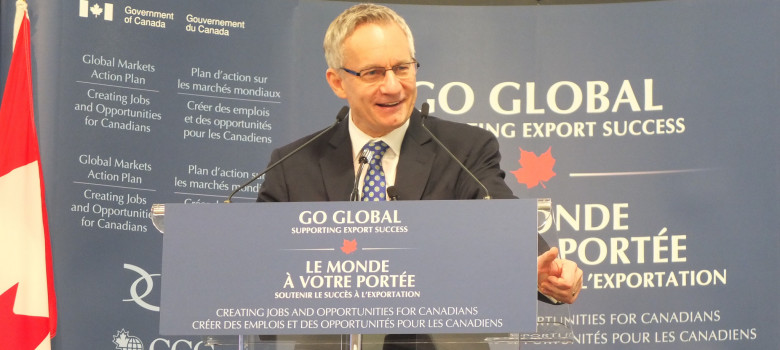The Trans Pacific Partnership negotiations concluded early this morning in Atlanta with the 12 countries reaching agreement on the remaining outstanding issues. The U.S. quickly posted a summary of the TPP and the Canadian government has followed with its own package on the deal. At a just-concluded ministerial press conference, the ministers noted that this is one step in a longer process. The text itself must still be finalized and then each country will have its own rules before signing onto it. In the U.S., there is a review period with the full text, so this will be a 2016 issue. In Canada, new treaties must be tabled for review in the House of Commons, so there will be a Parliamentary review.
With the election only two weeks away, that means that there will be no text to review before the national vote. Instead, Canadians will face a barrage of TPP claims:
- the Conservatives will argue that the deal benefits the Canadian economy and assure those negatively affected that there are measures in place to assist them. Issues such as an extension of the term of copyright (the government summary of the IP chapter does not reference term), new patent protections, restrictions on digital privacy protections, and the investor-state dispute resolution system that could lead to multi-million dollar lawsuits against the government will be largely ignored or characterized as the price to be paid for a deal. There will be no compensation for Canadians that lose access to public domain works for decades or find that their personal information is not stored in Canada due to anti-data localization provisions.
- the Liberals will largely punt on the issue, arguing that the party favours free trade agreements but that it can’t take a position on a deal it has not seen or studied.
- the NDP will ramp up anti-TPP discussion, though last week’s letter from NDP leader Tom Mulcair to the Minister Ed Fast primarily states that the NDP is not bound by any agreement signed by the Conservative government. As noted above, there is no agreement to sign before the election.
- business groups, who supposedly have not seen the agreement, will quickly issue press releases extolling its benefits. The concerns of groups such as Medicines Sans Frontiers, who point to the increased costs of pharmaceuticals, will not receive as much attention.
- the benefits of free trade will be the focus of many commentaries, painting opponents of the TPP as out-of-touch with global norms and the broader benefits that come with trade. Largely ignored will be that the TPP is about far more than market access with many of the most controversial elements involving regulatory or legal changes that export U.S. laws to other countries. Moreover, it bears mentioning again that Canada already has trade agreements with many of the key TPP countries including the U.S., Mexico, Chile, and Peru, thereby limiting the likely net benefits for Canada.
Notwithstanding the initial press coverage, without a text or any further leadership debates, it seems unlikely that the TPP will become a major election issue over the last 14 days of the campaign.








We can MAKE it an Election issue; if we all vow to visit local debates and when it is time for questions, bring up the TPP. When they can’t comment without seeing the text, that’s a great talking point in itself. Why would the teams from large corporations have access, while your representative does not? Why only a “swallow or suffocate” finalized text, with no public input at all? Just make sure the discussion doesn’t go to “farmers” ($12Bn in taxpayer funded handouts) or “auto industry” as it clouds the real issues that affect millions of Canadians directly.
I appreciate DMCA coming to Canada, “protection and enforcement to prevent the circumvention of technological protection measures and the removal of rights management information”. So, thanks politicians for selling us out. It won’t matter in the end, they can pass whatever they want, people will not be forced to restrict rights on their own property.
There is brief mention here and there above of “lost public domain” with little explanation of what exactly this means.
it means us copyright will extend to Canada, and all the fun that entails.
Could you elaborate on the “restrictions on digital privacy protections”? These sound like the exact opposite of what we all seek in our post-Snowden era. Thanks!
Of course this is opposite. This is about control very much more than trade.
“The concerns of groups such as Medicines Sans Frontiers, who point to the increased costs of pharmaceuticals, will not receive as much attention.”
Except by the US, which bombed the living sh*t out of them in Afghanistan. Disgusting.
GRUMP!
so go for a towfer.
the banned bacon sandwich as a TPP issue?
Very probable, in my view.
I live in a highly muslin neighborhood. They send police to your door via complaints for music, cartooning, drinking, (personal experience. acoustic guitarists, too.
and presumable bacon sandwiches as well.
only a few religious fanatics etc. SO? It’s still what happens. They are natizs
Pingback: Links 8/10/2015: KDE Plasma 5.4.2 Released, Linux Drama Queens | Techrights
Pingback: 6 reasons why you need to carefully read the small print on Harper’s Trans-Pacific Partnership deal | Ecocide Alert